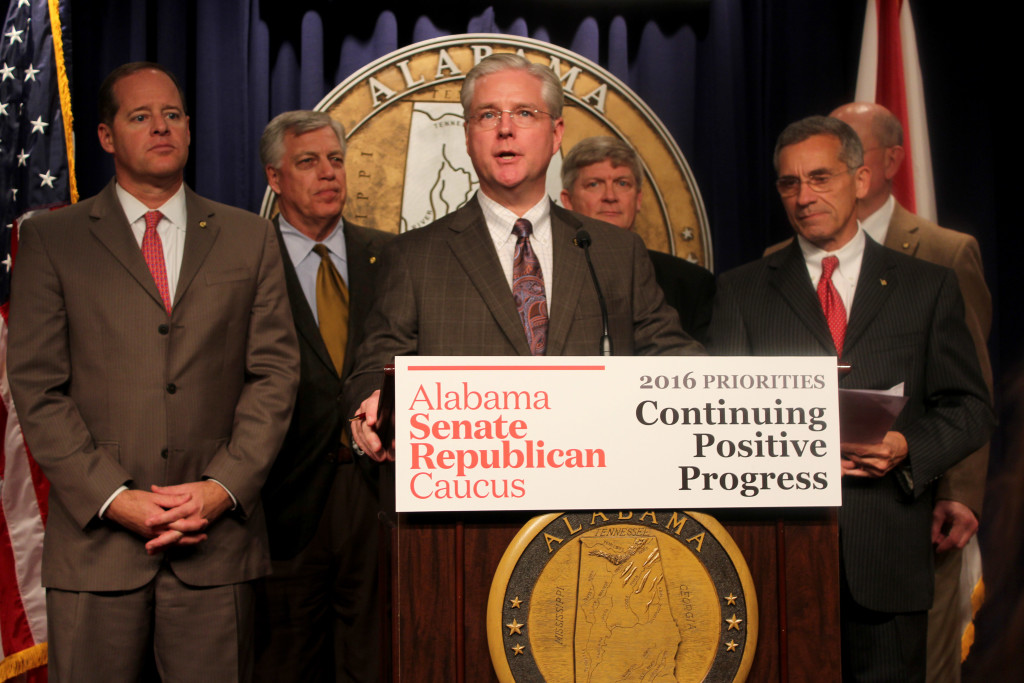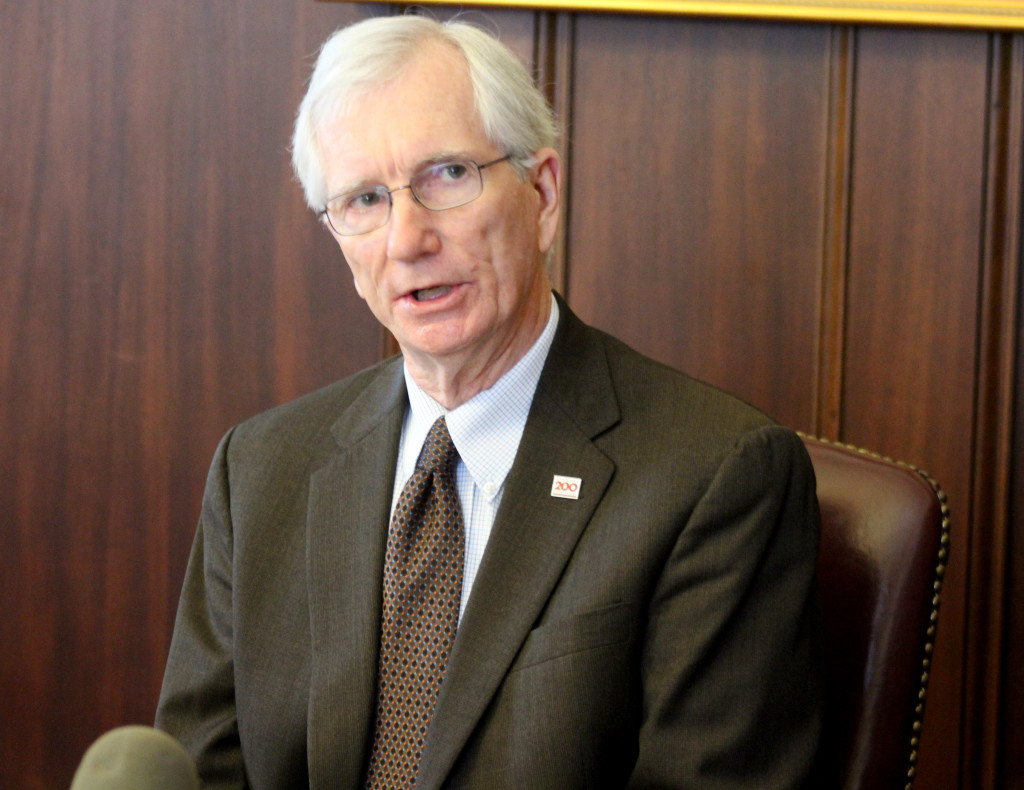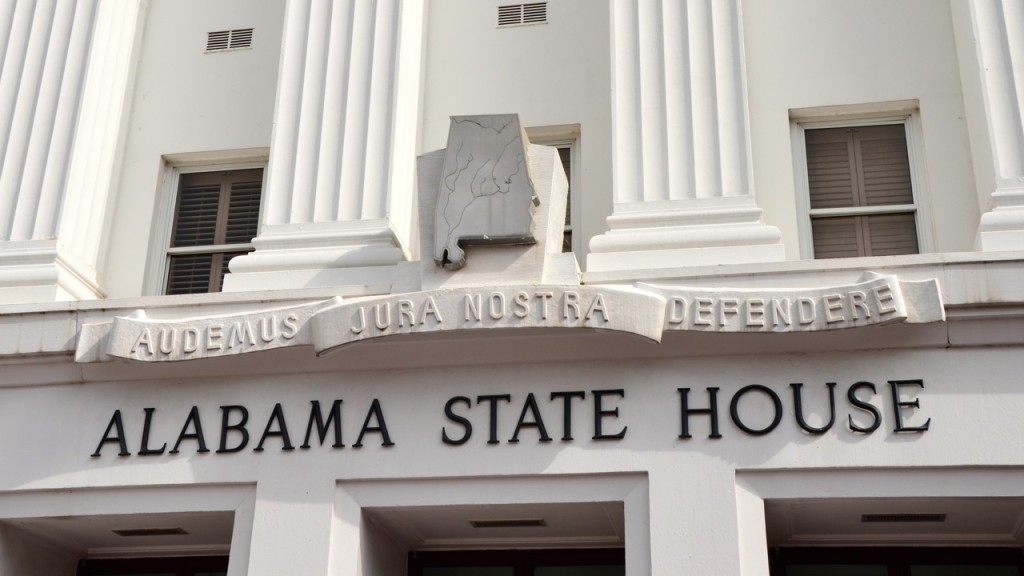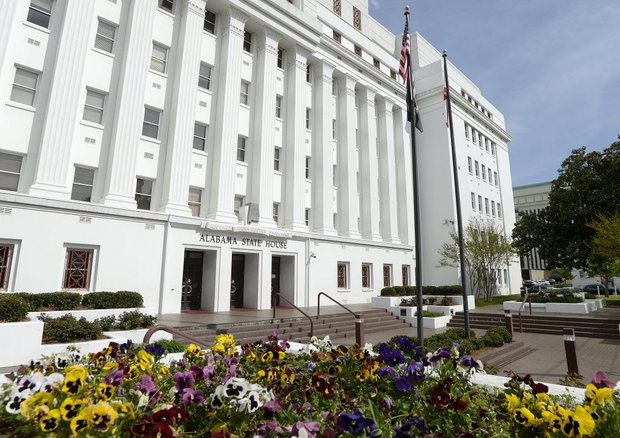Lawmakers approve small-business tax break for new jobs

After hearty debate on an earlier bill, state House members Tuesday launched into discussion concerning HB36, a bill brought forth by Rep. Kyle South (R-Fayette) to provide small business with fewer than 75 employees with a $1,500 tax break for every employee they hire who makes $40,000 a year or more. The bill would fund the tax credit, estimated at over $400,000, by taking money from the Education Trust Fund. Rep. Patricia Todd (D-Jefferson) was the first to speak on the matter. “You know how I feel about tax credits,” Todd said. “I don’t like them.” Todd noted that she will oppose the bill because it gives more tax breaks to businesses while ignoring some of the states more pressing issues, like balancing the budget and decreasing poverty in the state. Rep. Craig Ford (R-Baldwin) noted that he appreciated the bill, but could not support a bill which cuts taxes this year after raising taxes last year. After a brief round of amendments and technical questioning, the bill passed by a margin of 88 to 12 and the House adjourned for the day.
State Senate Republicans identify jobs, education and families among top priorities

Senate Republicans announced their agenda for this year’s legislative session, calling it “Continuing Positive Progress,” during a brief news conference Tuesday. Senate Majority Leader Greg Reed (R-Jasper) and Senate President Pro-Tem Del Marsh (R-Anniston) were on hand with others from the Senate Republican Caucus to discuss the group’s priorities for this year, which include spurring economic growth, protecting children and families and encouraging education excellence. “While addressing our primary goal of passing balanced, responsible budgets, Senate Republicans will also tackle our legislative priorities,” Reed said in a news release. “The people of Alabama elected us to focus on jobs, education, and families – and we’re doing just that.” In an effort to “spur economic growth,” Republicans plan to create “more flexibility to craft responsible, pay-as-you-go incentive packages” to create more jobs in the state. Further, Republicans plan to provide economic incentives to have companies use Alabama’s ports to ship products to the state – such products are often shipped to other ports and then brought into Alabama – which “will generate exponentially more tax revenue and jobs.” In its effort to “protect children and families,” Senate Republicans plan to pass both child abuse bills brought up in this morning’s judiciary hearing in an effort to protect Alabama’s “most vulnerable victims of abuse.” Republicans also plan to equip K-12 teachers with the tools needed to curb the rate of youth suicide in the state, which they say is a significant problem in the state. In its efforts to “encourage education excellence,” the Republican Caucus will support a pay raise for Alabama’s teachers, per Gov. Robert Bentley‘s proposal, and “incentivize accountability, specialized hiring and retention” by finding ways to rid the sate of ineffective educators and reward those who go above and beyond. During the press conference, Marsh commented on his RAISE Act, which has received a lot of negative attention from educators claiming it links teacher raises to test scores and student achievement. Marsh said the act does not link the two, it simply creates a five-year tenure track that can be reversed if teachers prove ineffective in preparing students. “We’re doing things I think are very positive,” Marsh said. “At the end of the day, we all want our children to do better.” Asked whether a proposal by Bentley to move Education Trust Fund dollars into the General Fund would gain traction in the Legislature, Reed said he didn’t know whether “there is a significant appetite” for such a move. In reference to a question on whether the repeal of Common Core curriculum standards would make it to the floor this year, Marsh said he is “not convinced those votes are there,” adding that it should be up to the state school board to make that decision.
Budget calls for un-earmarking education funds to square General Fund

Alabama Finance Director Bill Newton held a newss conference Tuesday to break down proposals from Gov. Robert Bentley concerning this year’s General Fund and Education Trust Fund (ETF) budgets. The governor proposed un-earmarking $181 million from the ETF, $150 million from use taxes and $31 million from insurance premium taxes, in an effort to square the General Fund. This year’s General Fund budget will total $1.93 billion, up from last year’s $1.85 billion budget, and provide a $100 million increase to Medicaid, a $70 million increase to the Department of Corrections, a $10 million increase to the Alabama Department of Public Health and a $5 million increase for the Department of Human Resources. The budget also calls for a 2.5 percent decrease in funding for the legislative branch, district attorneys, the finance department and the forensic science department, as well as a 5 percent decrease for agriculture and industry, military and the Department of Youth Services. The proposal also includes a 2 percent cost of living raise for education and state employees, with level funding for state employees’ healthcare at $825 monthly for each employee. Newton also addressed Bentley’s plan to close all of Alabama’s prisons and open four new facilities, saying the “significant savings” from eliminating the inefficient facilities would pay for the cost of construction, which is slated to be completed within three years. This year’s ETF will have an appropriation of $6.31 billion, up from last year’s $5.95 billion, of which the $181 million moved to the General Fund will be made up from the Budget Stabilization Fund, one of the state’s two savings accounts. K12 programs in the state will see an increase to $3.99 billion from last year’s $3.84 billion and an increase for universities from $1 billion last year to $1.08 billion this year. A new line item includes $40 million to fund the governor’s proposal to provide broadband internet to rural parts of the state. Additionally, an increase of more than $5 million will be allocated for textbooks, providing about $60 per student.
Robert Bentley supportive of lottery plan, with a catch

Gov. Robert Bentley came out in support of a lottery plan that is circulating among Montgomery law makers – but with one condition. Bentley has said he would change his stance on the issue if the revenues flow into the state’s General Revenue fund, as opposed to being earmarked for education purposes only as one going proposal would provide. The governor has by and large been opposed to any expansion of gambling, though that has softened in recent months. If the lottery is “clean” and resultant revenues flow into GR, “I would be willing to talk about it positively, but if it’s not I will have to go the other way,” Bentley said. The stipulation that the money go into the general budged, however, will likely reduce support among many lawmakers and Alabama voters, who see a lottery as worthwhile only if goes directly to the education budget. “If we put this before a vote of the people and it fails, I don’t think it will ever pass again,” said state Rep. Craig Ford, the House’s Democratic caucus leader. “I think it is more palatable to the people of Alabama if it goes to the education trust fund,” Ford said. Asked whether Bentley’s position is designed to ensure a lottery does not pass, Ford said: “It could be.” Bentley would not be able to veto or otherwise scuttle the bill by himself since the measure would be on the ballot during 2016 General Election in November, though he could throw his weight either behind or against the bill on the stump or through an advertisement campaign.
Phil Williams: Finding a new way to budget is key for Alabama’s future

The Dickens’ classic Oliver Twist transcends time and was a catalyst for social change in its day. As we enter the second special session of the Alabama Legislature to focus on the anemic and malnourished General Fund budget, I am reminded of a specific, iconic scene from Dickens’ novel. Young Oliver underfed and with circles under his eyes, finished his small bowl of gruel and decided he must ask the unthinkable. With deep contrition, he approached the overseer of the workhouse and held up his empty bowl and asked, “Please sir, may I have some more?” It is a poignant scene and unfortunately reminds me of the negotiating process between Alabama’s equally important, but unequally treated budgets. This year the Legislature passed one of the strongest education budgets in years. Reflecting an increase in overall spending at nearly $6 billion, the Education Trust Fund is set to experience a nearly $400 million surplus by the end of fiscal year 2016. Let that sink in for a minute. In the midst of constant calls for new taxes, we actually have a projected surplus well in excess of what is needed to fund both budgets. Alabamians have sent far more to Montgomery than is needed. The problem is not a lack of revenue but rather the unequal distribution of existing revenues. Every year the scene is repeated in Dickensian style as the General Fund looks to the Education Trust Fund and asks, “Please sir, may I have some more?” And the overseers decide if a bit more gruel will keep the little waif mollified. Make no mistake: I am proud of the education budget and I do not plan to reduce it. I was the deciding vote on the 2015 budget and a willing “yes” vote on the 2016 budget. I am a product of public education and have a family filled with public education employees. But I am asking for my fellow legislators to have the broader, statesmanlike view of the state as a whole. If we provide our citizens with a solid education but leave them with a state that does not properly fund medical needs, mental health, National Guard soldiers, prisons, the court system, State Troopers, senior meals, child advocacy, and all of the other crucial components of the General Fund, then they will take that state-funded education and go somewhere else. We can build the best state in the nation. We can have a state in which quality of education and quality of life coexist without one having to beg from the other. And believe it or not, we can do so without raising taxes. Unbeknownst to many Alabamians, a very simple bill has been introduced twice this year and promptly shelved by the gatekeepers who refuse to allow any crossover between the budgets. The bill authored by my conservative colleague Senator Paul Sanford simply allows for a perpetual split of recurring revenues: 78% to the Education Trust Fund, and 22% to the General Fund. This would increase the General Funds revenue base by an estimated $156 million and maintain a strong reserve for education. It is the right thing to do. It is systemic change and does not require new taxes. It is the change that I am prepared to fight for. The tax-raising bullies have been loud and boisterous lately. It is time for the citizens who have asked me over and over not to raise taxes to make themselves heard. It is time for the General Fund to be treated as an equal and not as a little beggar from a 19th century workhouse. Phil Williams represents Etowah, Cherokee, DeKalb and St. Clair Counties in the Alabama Senate. You may reach Senator Williams by phone at (334) 242-7857 or by e-mail at phil@williamsstatesenate.com.
Senate delays vote on controversial plan to unify state budget

After a lengthy debate on the Senate floor late Thursday, lawmakers voted to carry over a bill to unify the Alabama general fund and education budgets. Sen. Gerald Dial filed Senate Bill 502 to allow voters to decide whether to establish a single state budget and remove any recommendations or limits on how funds within that budget should be spent. On Thursday, Dial again urged lawmakers to allow the issue to go before the voters of Alabama: “I’m trying to offer another alternative to some of the problems we’re in.” Dial repeated the reasoning he used during the finance and taxation committee meeting this week, when he said that without the practice of earmarking, or placing limits on how money is spent within the budget, Alabama lawmakers might have a different set of funding decisions to make this session. Sen. Rodger Smitherman, a Democrat, spent more than an hour attempting to block the legislation over concerns that the proposal would erase funding for Alabama’s public schools. “I’m standing here for every child in Jefferson County because they can’t vote,” Smitherman said. “I’ve heard the facts, we are 49th in this country [for education], we can’t fully fund textbooks, the last time the teachers had a raise was 2008 […] now we’re saying that there’s enough money left in the Education Trust Fund to fund all these other things. Not on the backs of our young people.” The decision to carry over the legislation was made by voice vote.
Alabama House passes $6B education budget

Alabama House members passed a $6 billion state education budget on Thursday by a unanimous vote. Rep. Bill Poole, chair of the education committee said the goal of Senate Bill 179 was to shore up funding to classrooms. The budget includes a $13 million increase for textbooks and more than $10 million for the Alabama’s nationally-acclaimed Pre-K program. Lawmakers discussed the budget for less than an hour before voting unanimously for its passage. The Senate will need to address minor changes to the bill and vote for final approval.
Alabama legislative agenda preview: May 19-21

This promises to be a busy week at the Statehouse. Several news outlets are already reporting plans by House Speaker Mike Hubbard and Senate President Pro Tem Del Marsh to hold a press conference Monday to introduce “budget reform initiatives.” So far, no details have been made public. Keep checking ALToday.com for news. In budget-related news, House Bill 135, the general fund budget passed by the House ways and means committee on Thursday, is scheduled for a floor vote on Tuesday. However, Gov. Robert Bentley has already vowed to veto that proposal, calling it “unworkable” and “irresponsible.” The Ways and Means Education Committee is expected to vote on the state education budget on Tuesday afternoon. Senate Bill 179 has already passed the Senate. Also on Tuesday, House members are scheduled to debate appropriations for the Children’s First Trust Fund (House Bill 129) and the Coalition Against Domestic Violence (House Bill 134). Here are other items on the legislative agenda this week: •The Senate Judiciary committee is scheduled to vote on Senate Bill 468, also known as the Alabama Dog Tethering and Outdoor Shelter Act. Sen. Jabo Waggoner filed the bill to make it illegal for dog owners to tie their pets to stationary objects and says that any pet kept outside must have adequate food, water, and shelter. The dog chaining bill could be the last of four closely watched protections against animal cruelty this session. •The committee will also debate a proposal to penalize sex offenders who fail to register with the county in which they plan to reside. Sponsored by Rep. Juandalynn Givan, House Bill 316 also requires sex offenders to provide law enforcement with a list of any Internet providers they use. •A Senate health panel will consider Senate Bill 318, legislation to grant immunity to minors under the influence of alcohol or drugs and seeking medical help for another minor. •The House committee on education policy will hear Senator Waggoner present details on House Bill 664, a plan to allow members of the Alabama Public Charter School Commission to be appointed by the governor, lieutenant governor, president pro tempore of the Senate, and the speaker of the House of Representatives rather than the state board of education. •At 9 a.m. Wednesday, a House panel will hear public argument centering on tightening regulations of the title loan industry. House Bill 400, sponsored by Rep. Rod Scott, would require licensing for title loan offices and establish caps on charges, fees, and interest for title loans. •Rep. Arnold Mooney will appear before the House Judiciary Committee to present his measure banning assisted suicide in Alabama. House Bill 496 imposes civil and criminal penalties on medical professionals and care providers who provide help in dying under certain conditions.
Alabama Statehouse week in review: May 12-14

Thursday was Day 22 of the Alabama Legislative Session, which means lawmakers have just eight days left to pass budgets for public education and the general fund. Gov. Robert Bentley told The Huntsville Times this week that “the only constitutional duty that the Legislature has is to pass budgets … All this other stuff is just extra. If they fail at that job, then they’ve had a failed session – even though we’ve passed a lot of good bills.” House Republicans did pass a general fund budget out of the Ways and Means Committee on Thursday. The budget includes cuts to Medicaid, prisons and mental health. The proposal includes no tax increases, since House GOP members successfully pulled those from consideration Tuesday. Ways and Means General Fund Chairman Steve Clouse said in a prepared statement that that the budget package is simply a vehicle to send to the Senate so lawmakers there can send back their own budget proposal. On the heels of Clouse’s statement, Bentley issued his own strong language to the Legislature via reporters: “This budget is unworkable, it’s irresponsible, it really hurts people. The people who depend on the general fund for services – and that really includes everybody in the state of Alabama – will be hurt by this budget.” The governor also said that a Special Session is “certainly more likely.” Meanwhile, the Senate Committee on Tourism and Marketing cleared Sen. Del Marsh’s gambling proposal by a 5-3 vote. Several items not related to budget moved out of the Alabama statehouse this week. Here are a few that we’ve been watching: Funding for the Children First Trust Fund (House Bill 129) was approved by the House Ways and Means Committee by a unanimous voice vote. As money from the landmark tobacco settlement comes to Alabama, legislators appropriate a portion to the Children First Trust Fund to cover juvenile services, mental health and substance abuse programs, and child abuse and neglect. • • • Lawmakers gave a favorable report to House Bill 563 this week, though bill sponsor Rep. Patricia Todd told AL.com that the bill may not get much farther. She and Rep. Howard Sanderford sponsored the legislation to ensure that only licensed veterinarians can make medical or surgical decisions on the treatment of animals. The bill also says spay and neuter clinics would be regulated as veterinary facilities. • • • A bill to give judges, ministers and other officiants the right to refuse to perform marriage ceremonies is inching closer to becoming law, after a favorable report by the Senate Judiciary Committee this week. House Bill 56 passed the House in mid-March after four hours of emotional debate, AL.com reported. Bill sponsor Rep. Jim Hill said he brought the legislation after hearing from judges and ministers concerned about being forced to perform marriage ceremonies for gay couples. • • • The Senate Judiciary Committee also gave a favorable report to House Bill 237, a bill that would give grandparents the right to petition for visitation with their grandchildren. • • • Lawmakers voted down a bill that would impose term limits on the State Board of Education. The Montgomery Advertiser reported that committee members were concerned about the potential loss of institutional knowledge. • • • The Senate Committee on Fiscal Responsibility and Economic Development voted in favor of Senate Bill 452, legislation brought forth by Sen. Bill Holtzclaw to allow brewpubs to sell beer for off-premise (as well as on-premise) consumption. Keep checking ALToday.com for updates.
Lawmakers move bills on marriage, children closer to law
In case you missed it, panels in the Alabama House and Senate considered several key bills Wednesday. Here are a few that have been on our radar: •A bill to give judges, ministers and other officiants the right to refuse to perform marriage ceremonies is inching closer to becoming law, after a favorable report by the Senate Judiciary Committee on Wednesday. House Bill 56 passed the House in mid-March after four hours of emotional debate, AL.com reported. Bill sponsor Rep. Jim Hill said that he brought the legislation after hearing from judges and ministers concerned about being forced to perform marriage ceremonies for gay couples. •The Senate Judiciary Committee also gave a favorable report to House Bill 237, a bill that would give grandparents the right to petition for visitation with their grandchildren. That bill passed the House in late April. •House Bill 129, the appropriations bill for the Children’s First Trust Fund, was approved by the House ways and means committee by a unanimous voice vote. As money from the landmark tobacco settlement comes to Alabama, legislators appropriate a portion to the Children’s First Trust Fund to cover juvenile services, mental health and substance abuse programs, and child abuse and neglect. •Lawmakers gave a favorable report about House Bill 563 on Wednesday, though bill sponsor Rep. Patricia Todd told AL.com that the bill may not get much further. She and Rep. Howard Sanderford sponsored the legislation to ensure that only licensed veterinarians can make medical or surgical decisions on the treatment of animals. The bill also says spay and neuter clinics would be regulated as veterinary facilities. •The Senate committee on Fiscal Responsibility and Economic Development voted in favor of Senate Bill 452, legislation brought forth by Sen. Bill Holtzclaw to allow brewpubs to sell beer for off-premise (as well as on-premise) consumption. •Lawmakers voted down Senate Bill 465, a bill that would impose term limits on the State Board of Education. The Montgomery Advertiser reported that committee members were concerned about the potential loss of institutional knowledge. •A proposal to pool the state’s two major budget funds, the and the General Fund, into a new Alabama Recurring Expense Fund was rejected by a Senate panel. Sen. Paul Sanford said Senate Bill 12 would allow the general fund to share in some of the growth revenue now earmarked for what is essentially a savings account in the Education Trust Fund. We’re still waiting for committee decisions on the education budget and the General Fund budget. Votes on those bills have been rescheduled for at 8:30 a.m. Thursday. Sen. Del Marsh’s gaming legislation is scheduled for committee vote at 9:30 a.m. The full committee schedule is available here.
Proposal to revamp state budget structure stalls in Senate

As lawmakers continue to seek common ground to solve the state’s current budget challenges, the public had the chance to weigh in on a controversial proposal to guard against future shortages. Senate Bill 12, sponsored by Sen. Paul Sanford, would pool the state’s two major funds, the Education Trust Fund and the General Fund, into a new Alabama Recurring Expense Fund. According Sanford, the bill allows the general fund to share in some of the growth revenue now earmarked for what is essentially a savings account in the Education Trust Fund. In a presentation to lawmakers in March, the Legislative Fiscal Office projected a $287 million surplus in the Education Trust Fund and a $290 million shortfall in the General Fund. Some have questioned whether the practice of earmarking tax revenue for the Education Trust Fund – then creating a barrier between the education and General Fund – is the root cause of the state’s current budget shortfall. “There’s a crisis in the state of Alabama,” Sanford said. “We’ve tried some one-time fixes. It’s my understanding that the FY16 budget will have an excess of $200-225 million that will be diverted into the stabilization fund. (…) I certainly don’t want to look at families with kids and people with mental health problems and say we’re going to cut funds when we have $200 million sitting in a kitty not to be touched.” Several members of the committee expressed concerns that the proposal would siphon money away from education at a time when reports are that public schools in Alabama are underfunded. “I appreciate Senator Sanford for bringing this up. We’ve had a lengthy discussion on splitting the funding,” Sen. Gerald Dial said. “We don’t fund education as we should. I can’t vote for supporting a fund that’s going to balance the budget on the backs of kids.” Sens. Rodger Smitherman and Hank Sanders also expressed deep concerns about the proposal, citing inadequate funding for textbooks and school resources in the current budget. A favorable vote from the committee would have allowed the bill to go before the full body for a vote and, Sanford argued, a fair debate on all of the options to address the budget concerns. Sanford compared the state’s current fiscal situation to a household with a healthy savings account but in danger of having its lights cut off. “I’ve got a $150 million cork to plug the hole. It might take two or three other ideas, but I’m not going to watch [essential services] get cut off without dipping into my savings. If the taxpayers knew and recognized that there was several million going into a pot that can’t be touched, they might do what we would do in our own households.” “The state is in financial distress,” Sanford said. “But raising taxes is not the only way to plug this hole.” In a speech to lawmakers last year, Gov. Robert Bentley said that the General Fund was stretched thin because the fund covers the cost of prisons, courts, and Medicaid. However, state revenue from income, sales, and utility taxes are earmarked for the Education Trust Fund. The governor has argued for $581 million in tax increases as a way to drive revenue to the General Fund. At the public hearing on Wednesday, Susan Kennedy of the Alabama Education Association spoke in opposition to the proposal and suggested that the panel consider the business taxes that undergird the General Fund. “I applaud him for trying to address a problem we all know is there. But I disagree with the solution,” she said. “When you asked the people where their tax money should go, they said [it should go to] education. There are some taxes out there that the General Fund could take advantage of, and some extremely large tax exemptions. Maybe there will be a will to take advantage of those now.” The committee voted 8 to 5 to postpone the legislation indefinitely.
Senate panel to hear debate over proposal to revamp state budget structure
A proposal to cover General Fund expenses using surplus education funds will get a public hearing this week. The Senate finance and taxation committee will hear reasoning on both sides of the debate over whether pooling the state’s two major funds, the Education Trust Fund and the General Fund, could guard against future budget shortages. Senate Bill 12, sponsored by Sen. Paul Sanford, would establish a new fund to capture money allocated for both the Education Trust Fund and the General Fund. Every month, the Department of Revenue would cover the state’s expenses by dividing the balance of the new Alabama Recurring Expense Fund as needed. In a presentation to lawmakers last March, the Legislative Fiscal Office projected a $287 million surplus in the Education Trust Fund and a $290 million shortfall in the General Fund. Some have questioned whether the practice of earmarking tax revenues for the Education Trust Fund – then creating a barrier between the education and General Fund – is the root cause of the state’s current budget shortfall. In a speech to lawmakers last year, Gov. Robert Bentley said that the General Fund was stretched thin because the fund covers the cost of prisons, courts, and Medicaid. However, state revenue from income, sales, and utility taxes are earmarked for the Education Trust Fund. The governor has argued for $581 million in tax increases as a way to drive revenue to the General Fund. The public hearing will be held 10:30 a.m. Wednesday.


